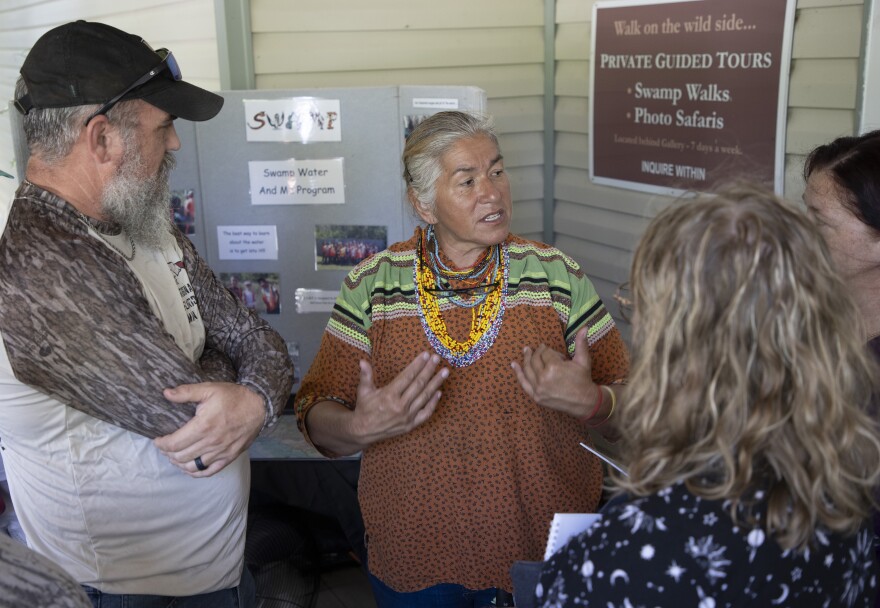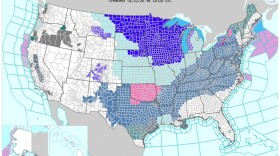
OCHOPEE – To the newcomer and grieving father, the Florida Everglades was foreign. It was scary. But four decades ago, this long-time Western photographer waded into the south Florida swamp after his son was killed by a drunk driver.
The water, the abundance of life around him, calmed his mind. It provided hope. And ultimately it healed what grief had broken.
And from this once scary swamp emerged one of Southwest Florida’s most legendary residents, Everglades photographer Clyde Butcher.
***
To her, the swamp is home, just is it had been home for her ancestors for centuries.
This, the Big Cypress Preserve in the heart of the Everglades, is sacred land. The swamp nourishes — both physically and spiritually — Betty Osceola and other members of the Miccosukee Tribe of Indians of Florida.
When Osceola was a young girl four decades ago, a particular place in this swamp provided important lessons. Those lessons were about the power of people when they put their differences aside for a common goal of stopping what was to be the world's largest jet port in the heart of the Everglades.
***
Born from this battle was America's first preserve, Big Cypress, and many of the environmental laws that exist today.
Now that very spot, where the people won the fight in 1970, is a newly constructed immigrant detention center.
Republican leaders are aggressively marketing the facility with the menacing name Alligator Alcatraz saying nature — alligators and pythons — will deter immigrant detainees from trying to escape.
That is not the Everglades that Butcher and Osceola are keenly familiar with. They are on a mission to educate the unfamiliar about the beauty, the power — and the incredible fragility — of the Everglades.
“This is a place to rebuild your soul. This is a place to relax," Butcher told a large group of people who came from around the state to his Ochopee gallery to hear him address Alligator Alcatraz.
Butcher regaled the group with tales of resting in the swamp while out on his photography missions.
"You just lay in the water, you get all refreshed, and you get going again. That's how un-dangerous it is. That's what got me so upset with this whole thing — this Alligator Alcatraz," he said. "I've been doing walks in Big Cypress for 40 years. Never met another person. I never met a gator. I mean, I've seen little gators. Every once in a while, you'll see one swimming away from you, but he's not swimming towards you."
Butcher was joined by Osceola, who lives near Alligator Alcatraz in one of some 10 tribal villages in the area.
"I think Clyde has said it best through his photography that this is not a god-awful place," she said, "It's a beautiful place full of life and very healing. And if you have followed Clyde, you understand his story and what photography and being out in this place has done for him."

Osceola explained her deep respect for her surroundings.
"I think about all the trauma that we are putting on the trees and the water, because they have memory," she said. "And my people say, whenever you take a footstep, the essence of you is left behind on this Earth, and the next generation that crosses that footstep picks up that memory. So always be mindful of how you want to make your footsteps, because somebody else is going to cross your footsteps and pick up that memory and it becomes a part of them. So what kind of memories are we trying to create?"
Both are banking on the power of the people to put aside their political parties and come through once again — this time to shutter a hastily built immigrant detention center.
"Sometimes we have a difference of opinion, but we all want the same thing. So that's why I pray for people to be human beings again and to connect. Because when you're in nature, it reminds you, and it gives you time to contemplate life in the greater universe and what's around you," Osceola said. "...And so you have to connect as human beings — human beings, not as Republican, Democrat, this, that or the other."

Osceola is inviting people of all faiths to join her from 1 to 4 p.m. Saturday outside of Alligator Alcatraz for an inter-faith prayer ceremony.
This is not one of the many demonstrations outside the gates. She is asking people to not bring protest signs.
"What I want you to bring is your love and your humanity and your spirituality," Osceola said. "... If you really believe in spirit and what life is about, then we need you to come in love and pray for this environment and pray for humanity."
WGCU is your trusted source for news and information in Southwest Florida. We are a nonprofit public service, and your support is more critical than ever. Keep public media strong and donate now. Thank you.















